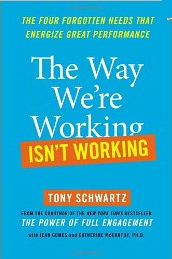If you have been exposed to the consulting that our company provides, then you’ve heard us talk a lot about the importance of being engaged in your work. We often reference studies performed by the Gallup Organization, which document that a large majority of those in the workforce are languishing in their jobs.
With the increased knowledge we have about work and the proliferation of new technologies that support smarter work habits, you’d think the percentage of people who are languishing in their jobs would start to decrease. But, this is not happening…
As documented in Tony Schwartz’s new book, "The Way We're Working is Not Working," the global workforce is still struggling to find engagement in their work.
“The consulting firm Towers Perrin’s most recent global workforce study bears this out. Conducted in 2007-2008, before the worldwide recession, it looked at some 90,000 employees in eighteen countries. Only 20 percent of them felt fully engaged, meaning that they go above and beyond what’s required of them because they have a sense of purpose and passion about what they’re doing. Forty percent were 'enrolled' meaning capable but not fully committed, and 38 percent were disenchanted or disengaged.
All of that translated directly to the bottom line. The companies with the most engaged employees reported a 19 percent increase in operating income and a 28 percent growth in earnings per share. Those with the lowest levels of engagement had a 32 percent decline in operating income, and their earnings dropped more than 11 percent. In the companies with the most engaged employees, 90 percent of the employees had no plans to leave. In those with the least engaged, 50 percent were considering leaving. More than 100 studies have demonstrated some correlation between employee engagement and business performance.”
So, 78% of the global workforce is either not fully committed or proactively disengaged in their jobs—and this was before the recession had an impact on these attitudes. It is probably safe to assume that things have gotten even worse as financial pressures have mounted for those in the workforce. If the researchers performed the study today (particularly in the real estate industry), they would probably have to create a fourth category below "disengaged" to capture all those people who are despairing!
While this research may seem like bad news, it actually presents quite an opportunity for a recruiter. Think of it this way: At least 78% of the people who you meet every day are either not fully committed or are completely disengaged in the relationship they have with their current employer. If your primary focus is recruiting agents from other real estate companies, that percentage is probably even higher. As you know, a person has to be experiencing some level of dissatisfaction to make a change. The happy people stay put.
If you’re responsible for recruiting, the important question becomes: How do you tap this deep level of disengagement and help people find engagement in your organization? I’ll cover this topic in more detail in our upcoming discussions, but here is a quick summary of what needs to happen:
- You Need to Be Engaged In Your Work. You’ll never be able to convince someone they will find engagement and satisfaction in your organization if you’re not personally engaged in your work. While being in a job that matches your talents is important, researchers are now learning that how you complete your daily tasks has a major impact on how much engagement you’ll experience.
- Surround Yourself With Those Who are Engaged In Their Work. Have you ever been on a team that is truly engaged in their task? If so, then you know that engagement is contagious. But, lack of engagement is also contagious. In fact, the negative inertia created by whom you associate with is one of the most significant factors that hinder personal growth. If a candidate's hope is to better their life by joining your team, they better find support when they get there!
- Become an Engagement Expert. With the previous two foundational issues in place, learning to communicate on the topic of engagement is one of the most powerful recruitment tools you can possess. But to be effective, you’ll have to become more knowledgeable on this topic and be able to speak to others on a new level. Don’t worry, it is not as hard as it sounds!
I look forward to working through these topics over the next couple of weeks. For now, see if you can put these three items into practice.
Editor's Note: This article was written by Ben Hess. Ben is the Founding Partner and Managing Director of Tidemark, Inc. and a regular contributor to WorkPuzzle. Comments or questions are welcome. If you're an email subscriber, reply to this WorkPuzzle email. If you read the blog directly from the web, you can click the "comments" link below.











